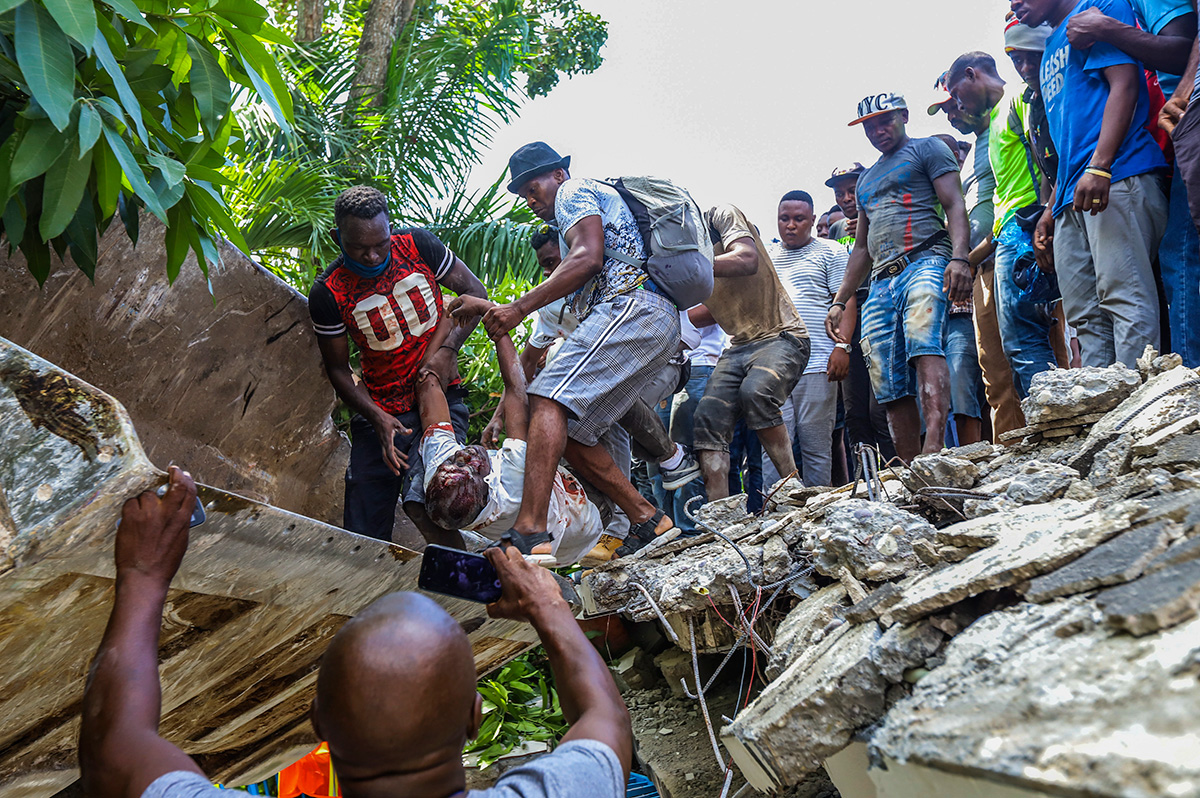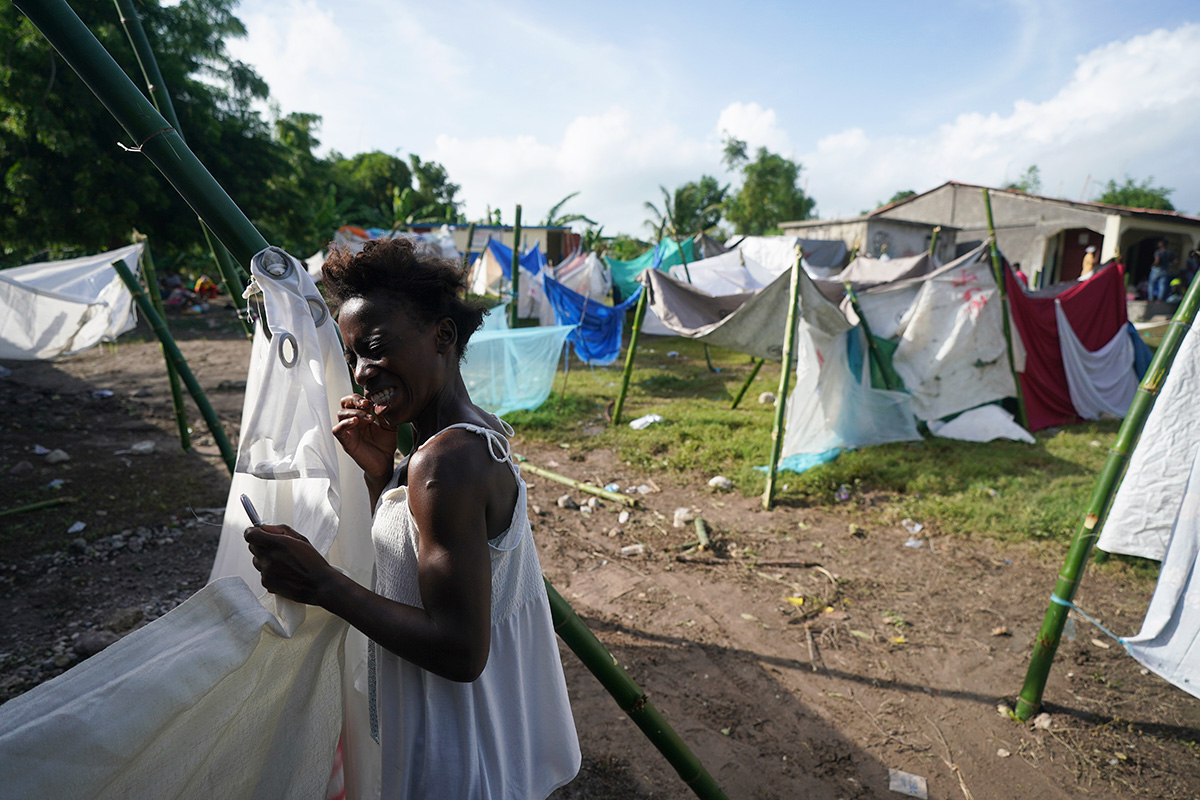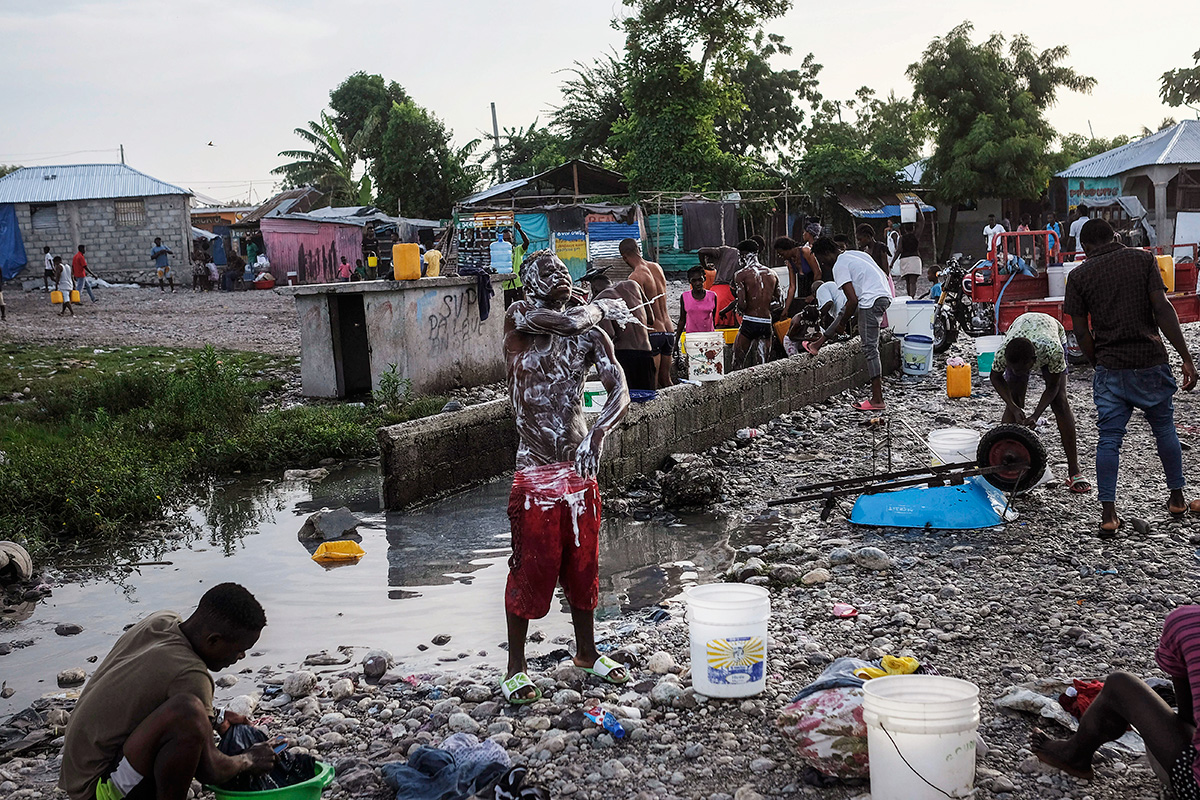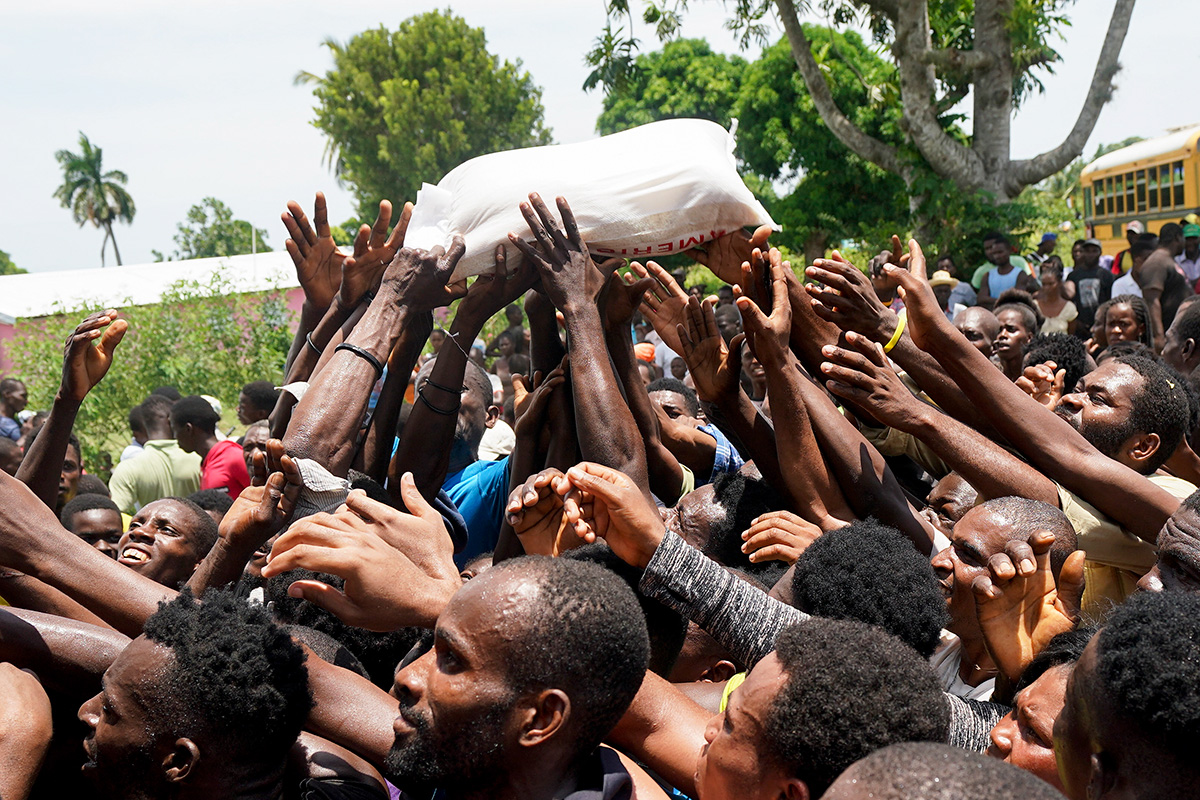Haiti: Devastation from the Earthquake… and a History of Foreign Domination
| revcom.us
The earthquake that hit Haiti on August 14 was a natural disaster that could not be prevented by human beings. But the Haitian people have been subjected to a very un-natural disaster created by capitalism-imperialism. The Haitian people have long suffered from unending poverty, hunger, and lack of education, health care, and other social services. And this is all due to decades of imperialist domination by the U.S. and other foreign powers. This has meant that now, in the wake of a devastating earthquake, there is needless death and suffering.
Saturday morning, August 14, a 7.2 magnitude earthquake hit Haiti. Three days later, Tropical Storm Grace hit the already ravaged landscape. The quake struck 80 miles west of the capital city of Port-au-Prince, with major devastation in the two small cities of Les Cayes and Jérémie.
Over 2,200 people are so far known to have died in the quake, and more than 12,000 suffered injuries, many of which are very serious—crushed and broken bones that require orthopedic surgery. And these numbers are sure to go higher as more bodies are found in the rubble and injured people make their way to hospitals. Using a scientific modeling tool, the U.S. Geological Survey estimates that deaths could be as much as 10 times what is now known.
Scenes of Devastation and Suffering
Haiti has a population of about 11 million people. UNICEF estimates that as many as 1.2 million people, including 540,000 children, have been impacted by the earthquake and the storm that followed. Thousands of homes and buildings have been destroyed.
Eleven years ago, in 2010, Haiti was hit with a 7.0 magnitude earthquake. The epicenter was just outside densely populated Port-au-Prince, where at the time, more than two million people lived. Some estimates put the number of dead at over 200,000.
The 2021 earthquake was more powerful than the 2010 earthquake. But the casualties, although still horrific, are way lower—mainly because this quake hit a less populated, rural area.
When the quake hit, 38-year-old Jean Marie Simon ran home to check on his family. He said, “I saw bodies being pulled out of the rubble, injured and perhaps dead people.... I heard cries of pain everywhere I passed through.”
Cristella San Helier, 21, said, “I was inside my house when it started shaking, I was near the window and I saw everything falling.... A piece of the wall fell on my back, but I was not seriously injured ... several houses were completely destroyed.”
Odize Bernadette, 42, said, “I don’t have anything. My children and I, we sleep on the ground. We don’t have food, we don’t have water, everybody’s house collapsed and we don’t know what to do.”
The handful of local hospitals (some severely damaged themselves) have been overwhelmed and hampered by a lack of basic supplies. Many of the injured are lying in hallways or outside. And medical staff say even after they treat the injured, they can only send them back to sleep in the street or in areas now in shambles. Aid has only just begun to arrive in significant amounts in the last few days—a week after the earthquake.1
In this situation, tensions have flared among survivors, and between the people and government forces. Chaos has erupted as people try to get the scarce supplies of food, water, and other life-or-death necessities that have been brought. At Les Cayes airport, police fired warning shots at angry crowds demanding tarps and other temporary shelters from crews unloading supplies from planes.
Even with so little outside assistance, people came together to erect a makeshift tent city in Les Cayes, sheltering under plastic tarps. But Mathieu Jameson, head of the committee formed by the tent city residents, said they were still waiting for any kind of government aid: “We don’t have a doctor. We don’t have food. Every morning more people are arriving. We have no bathroom, no place to sleep. We need food, we need more umbrellas.”
Earthquakes, Haiti, and U.S. Imperialism
Earthquakes are a devastating natural disaster that afflict many parts of the planet and which at this point humans can neither prevent nor reliably predict. But the human impact of an earthquake doesn’t just depend on its magnitude on the Richter scale, but on the social conditions in effect before and after. How sturdy are the homes people live in? How densely packed together are they? How desperate are people even before the earthquake strikes? What resources exist outside the quake zone to rescue people from the rubble and to treat the injured and feed and shelter survivors?
In earthquake-prone areas of wealthy imperialist countries, construction and zoning laws are crafted to minimize the impact of earthquakes; large amounts of heavy equipment, helicopters, etc. are on hand to rescue people; and medical care and food can be quickly mobilized.2 In 1989 a major earthquake hit the populous areas near Santa Cruz, California, but fewer than 70 people died. In countries like Haiti, oppressed and dominated by imperialism, it’s a whole different story.
So to understand the effects of the earthquake on Haiti, you have to look at the economic and political conditions that existed there before the quake, at the political crisis now wracking Haiti, and at Haiti’s “place” within the imperialist world order. In other words, you have to look at how Haiti has been enslaved, looted, isolated, robbed, and dominated by colonial and imperialist powers for hundreds of years. And you have to look particularly at the role of the U.S., which for more than a century has maintained a vice-like grip on Haiti, through repeated invasions, decades of military occupation, and by installing in power brutal and corrupt dictators who represented—or at least went along with—U.S. interests, and by overthrowing anyone who was not fully on board with that. (For more on the ugly history of the U.S. in Haiti, see: “Sean Penn, COVID-19 and Mass Murders” by Bob Avakian; and “The U.S. in Haiti: A Century of Domination and Misery.”)
U.S. domination has left Haiti and its people on the very edge of extinction, so that the impact and unnecessary suffering from every natural disaster is amplified 100-fold.
First, the masses of Haiti’s people are not only poor but often hungry even in “normal” times; the health care system barely exists, particularly outside of the capital city; and millions live in crowded and poorly constructed homes. Almost 60 percent of Haitians survive on less than two dollars a day. One in five children don’t live past the age of six, and of those who do, two-thirds are malnourished.3 In some parts of Haiti, there is only one physician for every 67,000 residents. On top of this, as COVID rages around the world, supplies of vaccines are monopolized by better-off countries—Haiti received no vaccines prior to July 15, and since then has received only 500,000 doses for its 11 million people.
And the country is still reeling from the July 7 assassination of President Jovenel Moïse, which came as a culmination of 20 years of U.S.-backed coups, military interventions, and other machinations4 aimed at ensuring U.S. control. These have led to intense and violent infighting within and near-paralysis of the Haitian governing class (see “A Presidential Assassination, Even More Horrors for the Masses of People”). Coupled with desperate poverty, it has also given rise to a situation in which large gangs that emerged in the slums of the capital are now in control of major roads leading to the earthquake zone, and are hijacking aid trucks and kidnapping doctors!
Hypocritical and Paltry Response from the United States
U.S. President Joe Biden claimed that “The United States remains a close and enduring friend to the people of Haiti” and “we will be there in the aftermath of this tragedy.” He claimed to have authorized an immediate response. This is just the stock speech U.S. presidents give when countries in which the main “disaster” is U.S. domination are hit by natural disasters. The sympathetic words (and whatever aid may follow them) are largely about maintaining the U.S.’s (completely undeserved) reputation as a “humanitarian savior,” which is part of how U.S. imperialism projects so-called “soft power” in its contention with other imperialists.
In reality, such aid almost never amounts to much, and almost always far less is delivered than promised. After the 2010 earthquake, then-U.S. President Obama promised $3.9 billion assistance to Haiti. But this money was either never delivered or ended up mostly going to U.S and other foreign corporations and suppliers. (See Haiti One Year After the Quake, The Rubble—and U.S. Imperialism—Remain.)
In the case of the latest earthquake, it is particularly galling because by the U.S.’s own account, as of August 20 it had only provided 33,000 pounds of aid. A U.S. Agency for International Development rescue team of 65 people and four search dogs were dispatched. This is a pittance compared to both the tremendous need and the tremendous wealth of the U.S. Likewise, the foreign NGOs (non-government organizations), on which Haiti has been forced to depend for crucial social services, have so far given little support.
But let’s not forget, the U.S. did dispatch 100 U.S. Marines—as if what people in Haiti really need right now is heavily armed killers who don’t even speak their language!
1. This is partly due to logistical problems: The few roads connecting the southwest of Haiti to the capital—where most of Haiti’s resources are concentrated—are damaged, and much of the quake zone itself is mountainous with many isolated communities. But mainly it is due to political factors that will be gone into below. [back]
2. It should be noted, though, that even though the material potential to deal with natural disasters exists, the reactionary, profit-driven, anti-people, and racist nature of the system often “gets in the way,” as we saw so painfully with Hurricane Katrina in 2005, and to one degree or another in pretty much every natural disaster. [back]
3. Sources: United Nations Development Program, Schools for Haiti Facts, World Bank, World Food Programme, End Slavery Now [back]
4. Starting with the CIA-backed coup against the popularly elected reformist, President Jean-Bertrand Aristide [back]
Locals in southern #Haiti are mobilizing to help each other, and pull victims from under the rubble, because the country has no government. The crime syndicate in power serves foreign powers and the bourgeoisie mafia. Haitians never give up. pic.twitter.com/c6eRdLV60W
— Madame Boukman - Justice 4 Haiti 🇭🇹 (@madanboukman) August 14, 2021

Jean Marie Simon, a resident of Les Cayes, said, "I saw bodies being pulled out of the rubble, injured and perhaps dead people… I heard cries of pain everywhere I passed through." Photo: AP

People came together to erect a makeshift tent city in Les Cayes, sheltering under plastic tarps. Photo: AP

Food, water, life necessities are scarce. Here people bathe in pools of water in the street because of lack of running water. Photo: AP

U.S. domination has left Haiti and its people on the very edge of extinction, so that the impact and unnecessary suffering from every natural disaster is amplified 100-fold. Hands reach for a bag of rice. Photo: AP
Get a free email subscription to revcom.us:

